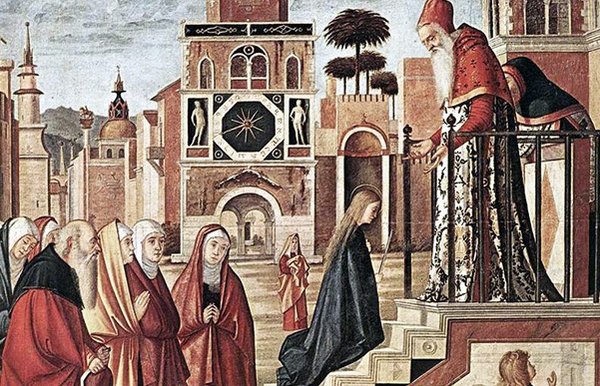The years of Mary's childhood were quiet, as befits her humility. Holy Scripture tells us nothing about them. Nevertheless, it is easy to understand why the early Christians were eager to know more about her life prior to the Gospel account of the Annunciation. And so, popular piety gave rise quite early to some simple stories inspired by passages from the Old and New Testament, and these found their way into Christian art, poetry, and spirituality.
One of these stories, perhaps the most typical, speaks about Mary's Presentation in the Temple. Joachim and Anne offered their daughter to God in the Temple at Jerusalem, just as another Anne, the mother of the prophet Samuel, had offered her son to God's service in the tabernacle where his glory was manifested (cf. 1 Sam 1:21-28). In the same way, some years later, Mary and Joseph would bring the newborn Child to the Temple to present him to the Lord (Lk 2:22-38).
"All her beauty and grace, in both soul and body, was for the Lord. That is the theological content of the feast of her Presentation."
Strictly speaking, no history exists of our Lady's early life; we have only what tradition has handed down to us. The first written text that refers to this event (which became the basis for later accounts) is the Protoevangelium of James, an apocryphal document from the second century. “Apocryphal" means that it does not belong to the canon of books inspired by God. But this doesn't mean it contains nothing true. In fact, the Church includes this scene in her liturgy, omitting possibly legendary elements. In Jerusalem, in the year 543, a basilica was dedicated to our Lady in memory of her Presentation. In the fourteenth century, this observance was commemorated in the West as a liturgical feast on November 21.
Mary in the Temple. All her beauty and grace, in both soul and body, was for the Lord. That is the theological content of the feast of her Presentation. The liturgy applies to our Lady some phrases from the Old Testament: “In the holy tent I ministered before him, and in Zion I fixed my abode. Thus in the chosen city he has given me rest, in Jerusalem is my domain. I have struck root among the glorious people, in the portion of the Lord, his heritage" (Sir 24:10-12).
Just as Jesus after he was presented in the Temple, Mary would have continued living a normal life at home with Joachim and Anne. Subject to her parents, growing towards womanhood, Mary was “full of grace" (Lk 1:28), her heart ready for a complete self-giving to God and mankind for the love of God.
"No one would have noticed anything unusual about Mary's behavior, though without doubt she charmed those around her because holiness is always attractive."
No one would have noticed anything unusual about Mary's behavior, though without doubt she charmed those around her because holiness is always attractive—more so in the case of one who is All-Holy. She was a smiling, hard-working young girl, always immersed in God, pleasant to everyone at her side. When she prayed, with a deep understanding of Holy Scripture, she would have often reflected on the prophecies that announced the coming of a Savior. That interior richness would later be poured forth in the marvelous verses of the Magnificat when she heard the greeting of her cousin Elizabeth.
Everything in our Lady's life was wholly oriented towards Jesus' Most Holy Humanity, the true Temple of God. The feast of Mary's Presentation teaches us that our Lady belonged only to God, that she was completely dedicated, in soul and body, to the mystery of salvation, which is the mystery of our Creator drawing near to his creatures.
“Like a cedar of Lebanon I am raised aloft, like a cypress on Mount Hermon, like a palm tree in Engedi, like a rose bush in Jericho, like a fair olive tree in the field, like a plane tree growing beside the water" (Sir 24:13-14). Holy Mary brought God's love to fruition around her. She did so without being noticed, because her deeds were those of every day, little things imbued with love.
J.A. Loarte
